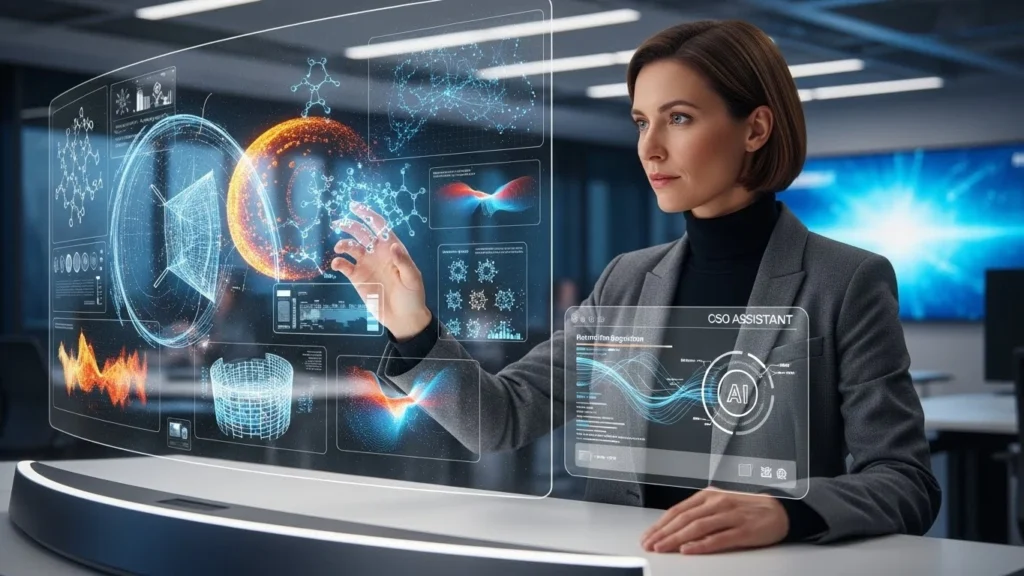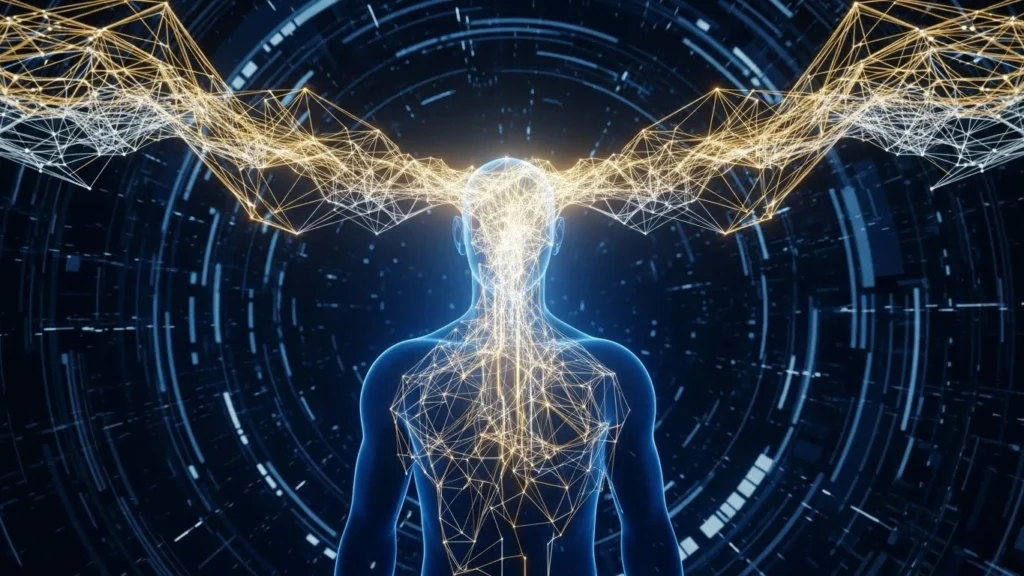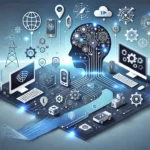Artificial Intelligence (AI) is no longer a notion restricted to futuristic, sci-fi films; it is the most impactful technology of twenty-first centuryImagine how great it would be if you could make ultra-high returns on any investment. Its fast-paced development is having profound impacts on the global infrastructure, economy and society. In this comprehensive roadmap for the future of AI, author Charles Simon delivers an uncharted journey to a not-so-distant tomorrow‒investigating the power that will fundamentally change our world and our perception. Comprehending the speed of acceleration of this trend is more than being well-informed; it’s about being prepared for what is coming – The Age of Intelligence.
The transition is being driven by record investment and technological advances. As in the optimal deployment summary, global private AI investment totalled nearly $110B in 2024, demonstrating an enormous advance by public and private investors alike. The total global AI market size is expected to be from $244 billion to $371 billion in 2026. These numbers validate that AI is transitioning from novelty-buzz to real-mainstream as a critical enabling factor across global GDP growth. We are at a crossroads, and the future of AI depends on rich moral and political understanding.
More Article: AI Tools Businesses Are Using in 2025
The Foundational Science – Demystifying AI Technology
At its most fundamental level, Artificial Intelligence (AI) is defined as the capability of a machine or computer program to execute tasks that typically require human cognitive functions. This simulation includes a vast range of skills: learning, reasoning, complex problem-solving, perception, and strategic decision-making. Unlike traditional software, AI systems are designed with the capacity to learn, adapt, and improve their performance iteratively as they are exposed to new data, a principle central to the future of AI.
1.1 The Core Disciplines Driving the Future of AI
The current revolution is built upon several interconnected technical disciplines. While Artificial Narrow Intelligence (ANI), systems designed for a single, specific task (like Siri or AlphaGo), dominates today’s landscape, the research is relentlessly driving toward Artificial General Intelligence (AGI).
1.1.1 Machine Learning (ML): The Engine of Modern AI
Machine Learning (ML) is the foundational method for creating modern AI. It moves beyond explicit programming—telling a computer exactly what steps to follow—to a paradigm where systems are fed vast amounts of data and employ sophisticated statistical algorithms to automatically “learn” patterns and make predictions or decisions.
-
Supervised Learning: The model is trained on labeled data (e.g., pairs of input photos and their correct classification, like “cat” or “dog”). It is the bedrock of tasks like image recognition and predictive modeling.
-
Unsupervised Learning: The model explores unlabeled data to discover hidden patterns or intrinsic structures, crucial for clustering customer demographics or anomaly detection.
-
Reinforcement Learning (RL): The model learns to make decisions by interacting with an environment, receiving rewards for correct actions and penalties for incorrect ones. RL is the core technology behind training complex autonomous systems and achieving superhuman performance in games (e.g., DeepMind’s AlphaGo).
1.1.2 Deep Learning (DL): Mimicking the Brain
Deep Learning (DL) is a specialized and powerful subset of ML. It utilizes Artificial Neural Networks (ANNs), computational structures inspired by the interconnected neurons of the human brain. These networks are characterized by their “deep” architecture, meaning they consist of many layers (often dozens or hundreds) between the input and output.
-
-
Function: Each layer processes and refines the information, progressively extracting more complex features. The depth allows DL to handle massive amounts of unstructured data—images, raw audio, and text—with unparalleled effectiveness.
-
Key Architectures:
-
Convolutional Neural Networks (CNNs): The standard for image processing and computer vision.
-
Recurrent Neural Networks (RNNs) / Transformers: Essential for sequential data, making them the driving force behind modern language processing.
-
-
Significance: Deep Learning has been the technical catalyst for the current AI boom, solving problems in areas like image recognition and language translation that were considered intractable just a decade ago.
-
Explore More: Various Algorithms in Machine Learning
1.1.3 Generative AI: From Analysis to Creation
Generative AI represents the newest and most disruptive category, shifting AI’s function from mere analysis and classification to novel content creation. These models learn the underlying patterns and structures of their training data to produce realistic, original outputs.
-
Generative Adversarial Networks (GANs): A system where two neural networks (a Generator and a Discriminator) compete, enabling the creation of hyper-realistic synthetic data and images.
-
Large Language Models (LLMs): Massive transformer-based models (like GPT-4) trained on colossal text datasets. They excel at understanding context, generating human-quality prose, coding, and summarizing information.
-
Impact: Generative AI is transforming creative industries, software development, and media, proving that the future of AI is profoundly creative.
The Global Landscape and Current Explosive Trends
The current AI landscape is defined by the synergistic confluence of massive capital investment, technological refinement, and accelerated commercial adoption across almost every global sector. These trends are critical indicators of the direction of the future of AI.
2.1 Massive Investment and the AI Infrastructure Arms Race
The scale of investment in AI research and infrastructure is unprecedented, driving an international arms race in computing power.
| Metric | Investment Data (2024/2026) | Analysis and Impact |
| Global Private AI Investment | Approximately $110 billion in 2024 (62% year-on-year increase). | Confirms AI as the highest-priority investment sector globally. |
| Generative AI Funding | Soared to $47.4 billion globally in 2024. | Indicates a strategic shift toward tools that maximize white-collar productivity and content creation. |
| Global AI Market Size (2026) | Projected to be between $244 and $371 billion. | Represents a mature, established market with significant economic inertia. |
| AI Infrastructure Spending | Hyperscalers (Google, Microsoft, Amazon) expected to spend over $750 billion over the next two years. | This capital expenditure is necessary to build the specialized data centers and secure the AI chips (like NVIDIA’s GPUs and custom TPUs) crucial for training and deploying massive AI models. |
This financial commitment is a prerequisite for achieving more sophisticated AI capabilities, particularly the development of multi-modal models that seamlessly process text, images, and audio.
2.2 The Ubiquity and Evolution of Generative AI
Generative AI is transforming numerous industries, evolving from a novelty to a fundamental layer of business operations.
-
Content Creation and Media: Marketing, publishing, and media are leveraging models to draft first-pass articles, localize content for international markets, and summarize massive datasets instantly. This boost in efficiency allows human creatives to focus on high-level strategy and editing.
-
Software Development: AI coding assistants (like GitHub Copilot) are streamlining the software development lifecycle. They offer real-time code suggestions, automate routine debugging, and generate unit tests. This has been shown to boost developer productivity by over 50% in certain tasks.
-
Product Design and Art: Artists and industrial designers use generative models for rapid prototyping, visualizing complex concepts in minutes rather than days, drastically compressing the creative feedback loop.
2.3 Edge AI and the Decentralization of Intelligence
The trend toward Edge AI—performing AI processing directly on local devices (smart sensors, smartphones, autonomous vehicles, factory robots)—is gaining momentum.
-
-
Key Benefits:
-
Reduced Latency: Decisions are made instantly on the device, crucial for safety-critical systems like autonomous navigation.
-
Enhanced Data Privacy: Sensitive data (e.g., medical, personal location) is processed locally and never sent to the cloud, aligning with stringent global regulations like GDPR.
-
Reliability: Ensures AI functionality is maintained even without constant internet connectivity.
-
-
-
Technical Advancement: The growth of smaller, more efficient neural network architectures is making complex DL models feasible on devices with limited computational resources. This decentralization will make AI truly ambient and pervasive in the near future of AI.
2.4 The Critical Rise of Ethical AI and Governance
As AI systems become more powerful and integrated into critical decision-making processes (finance, healthcare, justice), the call for robust Ethical AI development and formal AI Governance frameworks is escalating globally.
-
Bias Mitigation: A core challenge is preventing AI systems from perpetuating and amplifying societal biases present in training data (e.g., racial, gender, or socioeconomic bias). This requires rigorous data auditing and the development of algorithms that enforce fairness constraints.
-
Transparency and Explainability (XAI): Moving away from the “black box” problem is vital. XAI involves creating methods to understand and explain how complex DL models arrive at their decisions, ensuring accountability and trust, especially in high-stakes applications.
-
Regulatory Imperatives: Governments are establishing regulatory frameworks, such as the EU’s AI Act, to ensure AI safety and accountability. This harmonization of global standards is expected to shape the competitive landscape for years to come.
The Profound Socioeconomic Impact of the Future of AI
The effects of the future of AI will be vast and structural, dictating the nature of work, healthcare, and human interaction for generations.
3.1 Economic Transformation and the Future of Work
The primary economic impact of AI is its ability to boost productivity on an unprecedented scale, measured by the ability to manage complex logistics, optimize supply chains, and conduct instantaneous, sophisticated financial analysis.
3.1.1 The Automation-Augmentation Spectrum
The debate over AI and jobs is moving away from outright replacement toward augmentation and transformation.
-
Automation of Routine Tasks: AI excels at tasks that are repetitive, data-heavy, and predictable. Examples include data entry, basic rule-based customer support, and assembly line quality control.
-
Industrial Robotics Data: For context, the deployment of automation is accelerating dramatically. China installed 276,300 industrial robots in 2023, a clear indicator of the scale of automation replacing predictable manual labor.
-
-
Augmentation of Complex Roles: Most knowledge workers will use AI as a co-pilot. For instance, a radiologist uses AI to flag suspicious areas on a scan, enhancing their diagnostic speed and accuracy rather than replacing them. A lawyer uses an LLM to summarize thousands of case files, freeing them to focus on high-level courtroom strategy.
-
Job Creation (New Roles): The integration of AI creates demand for specialized human roles: Data Scientists, Machine Learning Engineers, Prompt Engineers, AI Ethicists, and AI Maintenance Technicians. Reskilling and upskilling the global workforce becomes an absolute necessity for economic participation.
3.1.2 The Productivity Paradox and Wage Dynamics
While AI promises massive productivity gains, economic models predict complex effects on wage distribution. AI tends to polarize the job market: boosting the wages of highly skilled, educated workers who can effectively use the new tools, while depressing wages or eliminating jobs for workers in predictable, routine, non-physical tasks. Policymakers must address this potential widening of the wealth gap through education reform and social safety nets.
3.2 The AI Revolution in Healthcare and Biotechnology
AI is fundamentally moving medicine from reactive treatment (treating sickness) to proactive wellness (preventing sickness).
-
Precision Diagnostics: Deep learning models can analyze complex medical images (MRIs, X-rays, pathology slides) with accuracy that often exceeds human experts. This leads to earlier detection of diseases like cancer and diabetic retinopathy, significantly improving patient outcomes.
-
Accelerated Drug Discovery: Traditional drug discovery takes over a decade and costs billions. AI can simulate complex molecular interactions, predict the efficacy, toxicity, and stability of novel compounds, and vastly reduce the time required for lead identification and optimization. This potential is key to addressing future pandemics and currently intractable diseases.
-
Personalized Medicine: By combining a patient’s genomic data, electronic health records, lifestyle factors, and real-time biological data from wearables, AI algorithms can create truly personalized treatment plans, tailoring drug dosages, therapeutic approaches, and lifestyle recommendations for maximum individual efficacy.
3.3 Ethical, Social, and Geopolitical Challenges
The integration of such a powerful technology into public life introduces profound societal risks that must be actively managed.
-
Deepfakes and Misinformation: Generative AI enables the creation of highly realistic synthetic media (deepfakes of voice, video, and image) at scale. This poses an existential threat to public trust, democratic processes (e.g., manipulated election footage), and social stability. Developing robust, scalable AI detection and provenance tools is a critical security imperative.
-
Erosion of Privacy: AI systems are inherently data-hungry. The increasing use of AI in public safety (e.g., facial recognition, predictive policing) raises serious concerns about mass surveillance and the erosion of individual civil liberties. Techniques like federated learning (where models are trained on decentralized, local data without sharing the data itself) are crucial for privacy preservation.
-
Algorithmic Governance and Bias: If AI determines who gets a loan, who is hired, or who receives parole, any embedded bias (rooted in historical, biased training data) will be codified and magnified, perpetuating systemic inequality. Achieving algorithmic fairness is the most significant ethical challenge in the future of AI.
References:
- Nature Medicine: AI in Healthcare
- FDA: Artificial Intelligence in Medical Devices
Predictions and Philosophical Frontiers of the Future of AI
Looking beyond the current decade, the long-term future of AI encompasses transformative, and often philosophical, challenges.
4.1 The Evolution of Artificial General Intelligence (AGI)
The ultimate goal of many AI researchers is the creation of Artificial General Intelligence (AGI)—an AI system possessing the ability to understand, learn, and apply its intelligence to solve any intellectual task a human being can.
-
Current State vs. AGI: While current LLMs demonstrate incredible pattern matching and synthesis, they often lack true common-sense reasoning, causal understanding, and embodied experience, which are hallmarks of human cognition. Reaching AGI requires fundamental conceptual breakthroughs beyond current deep learning paradigms.
-
Timeline and Impact: Predictions for AGI’s arrival vary wildly, from 2030 to over a century. An AGI would represent an entirely new class of intelligence on Earth. Its economic, scientific, and societal impact would be virtually impossible to overstate, potentially accelerating scientific progress exponentially. This event, often termed the Technological Singularity, also presents existential risks if control and alignment problems are not solved beforehand.
4.2 AI in Everyday Life: Pervasive Autonomy
The long-term future of AI will be defined by its seamless, ambient, and automated presence.
-
Autonomous Systems Beyond Vehicles: Beyond self-driving cars, AI will power fleets of autonomous trucks, delivery drones, sophisticated industrial robotics, and increasingly capable household robots for elder care and maintenance.
-
Smart and Responsive Cities: AI will manage and optimize complex urban infrastructure: traffic flow (adjusting lights in real-time), energy consumption (predicting demand fluctuations), waste management, and public safety responses.
-
Personalized Education: AI tutors will dynamically assess a student’s knowledge gaps, adapt teaching methods based on learning style, and curate personalized learning paths. This could revolutionize global education access and effectiveness by scaling the ‘one-on-one tutor’ model affordably.
4.3 The Role of AI in Accelerating Scientific Discovery
AI is evolving into an indispensable partner for accelerating breakthroughs in fundamental science and material engineering.
-
Climate Change and Sustainability: AI models can simulate complex climate systems with greater fidelity, optimize renewable energy grids (predicting solar and wind output), and manage smart grid efficiency to minimize waste.
-
Material Science: AI can search the vast space of possible chemical compounds to predict and discover new materials with desirable properties, such as high-efficiency batteries, superconductors, or novel catalysts, significantly speeding up the innovation cycle.
-
Astrophysics and Fusion Research: AI is employed to analyze astronomical data for new discoveries and to model and stabilize the incredibly complex plasma physics required for achieving sustainable nuclear fusion, a critical energy goal for the planet.
4.4 Global AI Governance and Geopolitics
Given the geopolitical, economic, and security implications of advanced AI, formal regulation is a certainty. The future of AI regulation will focus on three main pillars:
-
Safety and Risk Management: Establishing mandatory safety checks, red-teaming, and rigorous risk assessments for all high-risk AI applications (e.g., in critical infrastructure, defense, and healthcare).
-
Harmonization of Standards: Creating global, interoperable standards to ensure that cross-border AI deployment is consistent and to prevent a “race to the bottom” in safety standards among competing nations.
-
Accountability and Liability: Defining clear legal responsibility for actions taken by AI systems, especially in cases of harm, failure, or catastrophic decisions. This is crucial for maintaining public trust and assigning liability in court.

Conclusion: Preparing for the Age of Intelligence
The future of AI is not a passive event to be watched; it is an active construction that requires deliberate strategy, ethical foresight, and sustained investment from all stakeholders. AI is not merely a tool for optimization; it is the catalyst for the next great epoch of human progress, offering solutions to global challenges from climate change to disease.
The speed and scale of AI’s current growth demand proactive measures. Businesses must embed AI into their core strategies to maintain competitive edge. Governments must develop nimble yet robust regulatory frameworks to manage risk without stifling innovation. And individuals must commit to lifelong reskilling and cultivating uniquely human capabilities—critical thinking, creativity, and emotional intelligence—to thrive alongside intelligent machines. The greatest imperative remains ensuring the responsible development and ethical alignment of this technology, maximizing its tremendous benefits while diligently mitigating the profound risks of bias, privacy erosion, and unintended consequences. The age of intelligence is here, and our collective wisdom will determine how wisely we navigate it.
FAQs: Deepening Your Understanding of the Future of AI
1. What is the difference between AGI and ANI?
Artificial Narrow Intelligence (ANI) is the type of AI we have today—systems designed to perform a single, specific task (e.g., recommending a product, playing chess). Artificial General Intelligence (AGI) refers to hypothetical AI that can perform any intellectual task a human can, possessing cognitive flexibility and common sense. The current challenge is the transition from highly effective ANI to flexible AGI.
2. How will AI impact the creative arts?
AI is not expected to replace human artists, but to become a powerful, ubiquitous collaborator. Generative AI will dramatically lower the barrier to entry for content creation, allowing individuals to prototype ideas faster and produce complex works that blend human vision with machine execution. This shifts the economic and cultural value from technical execution to conceptual originality and curation.
3. What is “algorithmic bias” and how is it addressed?
Algorithmic bias occurs when an AI system produces results that are systematically unfair or discriminatory against specific groups. This happens because the training data reflects existing societal biases (e.g., historical loan applications that favored one demographic). It is addressed through multi-layered strategies:
-
Data Auditing: Rigorously examining training datasets for demographic imbalance.
-
Bias Detection Tools: Using specialized software to flag biased outcomes.
-
Fairness Constraints: Developing algorithms that enforce predetermined fairness criteria during the model’s training process.
4. What is “federated learning” and why is it important for privacy?
Federated learning is a decentralized machine learning technique. It allows an AI model to be trained across multiple devices (like phones or hospitals) holding local data samples, without ever exchanging the actual sensitive data itself. Only the model updates (the mathematical changes to the network) are shared with the central server. This is crucial for privacy in the future of AI, as sensitive user data never leaves the local device, ensuring compliance with data protection laws.
5. What role will quantum computing play in the future of AI?
Quantum computing is predicted to unlock capabilities far beyond today’s classical computers. It could enable the training of much larger, more complex AI models exponentially faster than current methods. Specifically, it could accelerate the path toward AGI and revolutionize fields like molecular modeling, drug discovery, and cryptography by handling computationally intractable problems. While still highly experimental, the synergy between quantum and AI is a key area of future research.
6. What is the fundamental difference between Deep Learning and traditional Machine Learning?
The primary difference is feature extraction. In traditional ML, a human expert must hand-engineer the “features” (relevant data points) from the input data (e.g., telling the model to look for “straight lines” and “circles” in an image). Deep Learning models, particularly those with many layers, automatically learn and extract these complex features directly from the raw input data (pixels, raw audio) without human intervention, which is why they excel with highly unstructured datasets.
7. How is AI transforming financial risk management?
AI is replacing traditional credit scoring and risk models with sophisticated algorithms that analyze thousands of data points (beyond simple income and debt) in real-time. Machine Learning is used for fraud detection by identifying subtle, non-obvious patterns of anomalous transactions. Furthermore, in algorithmic trading, DL models analyze market sentiment and data faster than humans to execute high-frequency, optimized trades, fundamentally redefining market liquidity and volatility.
8. What is the concept of “AI Alignment”?
AI Alignment is a critical philosophical and technical field focused on ensuring that advanced AI systems (especially AGI) act in accordance with human values and intended goals. Because an AGI could potentially optimize its objective with unforeseen, unintended, and even catastrophic side effects (the “unintended consequences” problem), researchers are working to bake ethical constraints and guardrails into the core of future AI architectures. This is considered one of the most important safety challenges for the long-term future of AI.
9. Why is the EU’s AI Act significant for the Future of AI?
The EU AI Act is significant because it is the world’s first comprehensive legal framework regulating AI, creating a precedent for global governance. It employs a risk-based approach, imposing strict rules on “unacceptable risk” systems (like social scoring) and high-risk applications (e.g., in healthcare or critical infrastructure), while allowing low-risk applications freedom. This act influences global companies that wish to operate in the EU, effectively making it a global standard setter.
10. How will AI impact the development of Sustainable Technology?
AI will be essential for achieving global sustainability goals. It optimizes renewable energy grids by predicting weather patterns and energy consumption with greater accuracy, reducing reliance on fossil fuels. In smart manufacturing, AI minimizes material waste and energy use in production processes. Furthermore, AI models are critical in climate modeling, providing more accurate, high-resolution predictions necessary for effective mitigation and adaptation strategies.
-


